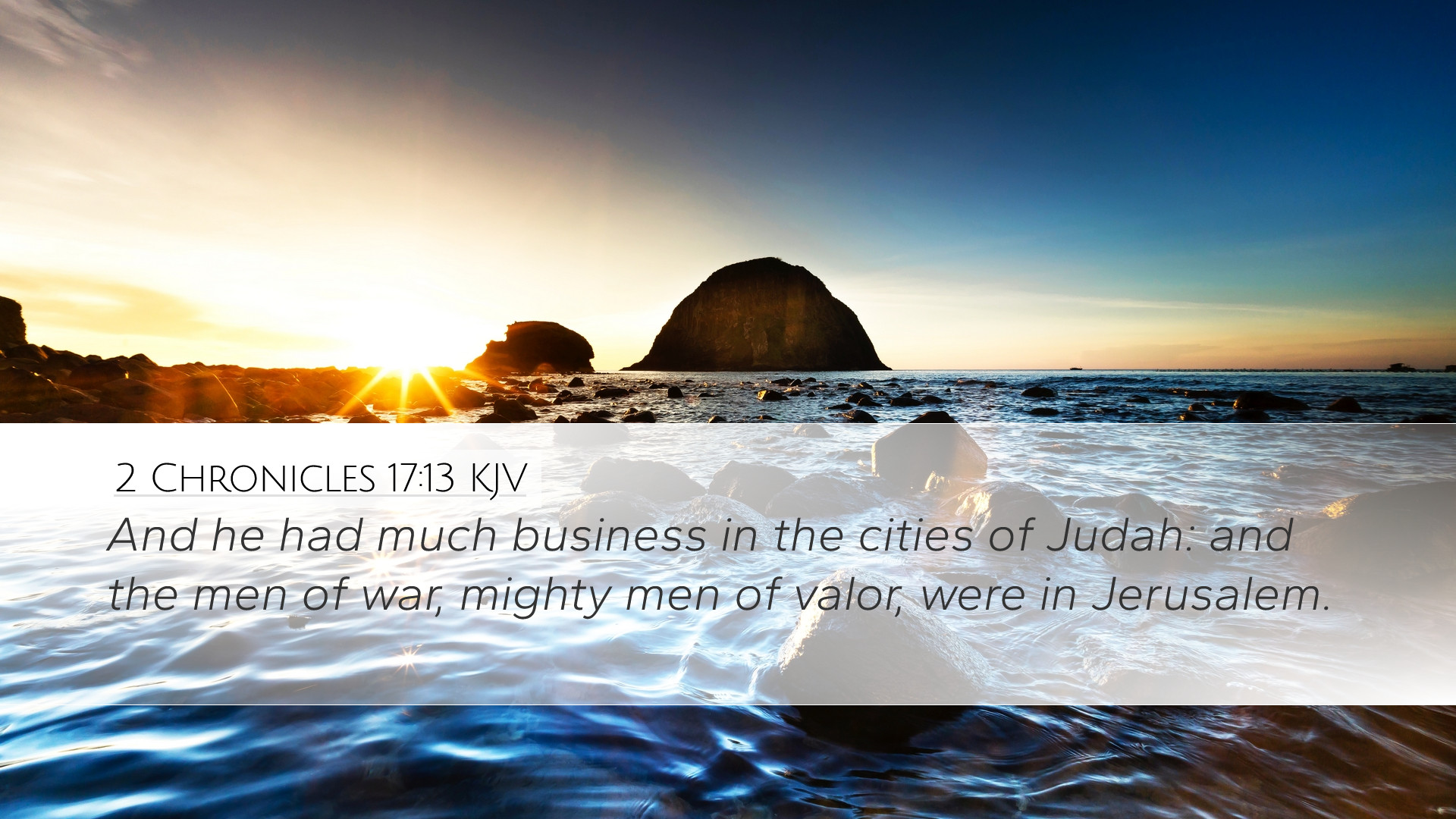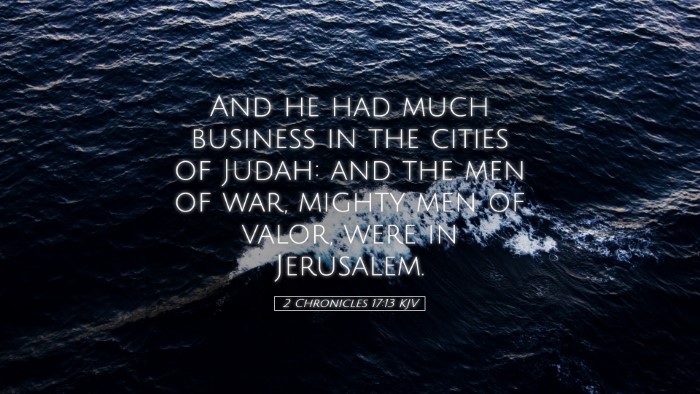Commentary on 2 Chronicles 17:13
Verse: 2 Chronicles 17:13 - "And he had much business in the cities of Judah: and the men of war, and the mighty men of valor, were in Jerusalem."
Introduction
The phrase “much business” in this verse signals a period of administrative activity under King Jehoshaphat's reign. This commentary synthesizes insights from respected public domain biblical scholars to elucidate the implications of this verse for contemporary readers, especially pastors, students, theologians, and Bible scholars.
Contextual Background
Jehoshaphat, the son of Asa, took the throne in Judah after his father. His rule is characterized by significant military and political restructuring aimed at securing peace and strengthening the kingdom. The emphasis on “business in the cities of Judah” suggests both administrative dealings and military preparations.
Historical Setting
During Jehoshaphat’s reign, Judah had to contend with numerous external threats. His militaristic strategy included fortified cities and the incorporation of an organized military structure. The historical context sheds light on the necessity for the king to engage actively in administrative and military preparations.
Spiritual Context
Jehoshaphat’s commitment to spiritual reforms (2 Chronicles 17:6-9) added a further dimension to his rule. He directed the people back to the law of the Lord, effectively intertwining the civil and spiritual governance, which undergirded his military and administrative endeavors.
Insights from Commentators
Matthew Henry’s Commentary
Matthew Henry emphasizes the importance of diligence in administration. He notes that Jehoshaphat's activities in the cities of Judah demonstrate a well-ordered kingdom. According to Henry, “Wherever there is a necessity of business, there must be diligence.” This highlights the idea that leadership is not merely about authority but requires active engagement with the people and their needs.
Albert Barnes’ Notes on the Bible
Barnes expounds on the phrase “men of war and mighty men of valor.” He suggests that the king’s attention to military matters was vital for the security of the nation. This ensures that Judah had capable defenders against potential adversaries. Furthermore, he underlines Jehoshaphat's choice to fortify Jerusalem as indicative of strategic foresight.
Adam Clarke’s Commentary
Clarke provides an interesting interpretation regarding the phrase “much business.” He explains that it reflects both the administrative responsibilities of Jehoshaphat and the necessity of a strong judicial system to maintain peace. Clarke also notes that a good ruler must ensure that justice and order are upheld in the cities, roles in which Jehoshaphat actively engaged.
Theological Implications
The activities in 2 Chronicles 17:13 reflect deeper theological truths about the nature of God’s sovereignty in leadership. Jehoshaphat’s endeavors can serve as a model for contemporary leaders in the church and community, emphasizing the need for responsible governance coupled with a return to God’s guidance through scripture.
Leadership Under God
Jehoshaphat’s reign illustrates how effective leadership is an act of service rendered unto God. His dedication to the fortification of Judah’s cities and promotion of justice underscores the concept that leaders are stewards of both their power and the well-being of their people. This aligns with the biblical principle seen in Romans 13, where governing authorities are instituted by God.
Practical Applications
For pastors and Christian leaders today, the teachings derived from this verse are invaluable:
- Engagement in Community: Like Jehoshaphat, leaders should actively engage with their communities, addressing both spiritual and social needs.
- Military Preparedness: While the context of warfare may differ now, the principle of being prepared for challenges in ministry remains vital.
- Justice and Righteousness: Ensuring that justice reigns in leadership is paramount. Leaders must advocate for the marginalized and uphold truth within their councils.
- Spiritual Renewal: Prioritizing a return to biblical principles—to seek the Lord and implement His laws in everyday governance and decision-making.
Conclusion
The multifaceted insights from historic commentaries reveal that 2 Chronicles 17:13 offers more than just a description of Jehoshaphat’s administrative duties; it is a profound exploration of the interplay between divine guidance, responsible leadership, and the ethical implications of governance. For modern readers, these themes remain universally applicable in diverse contexts—governmental, ecclesiastical, and personal.


